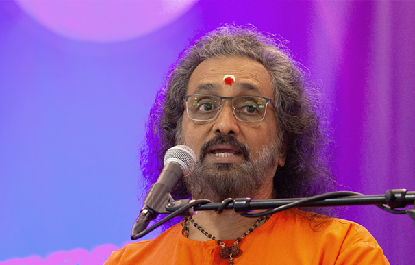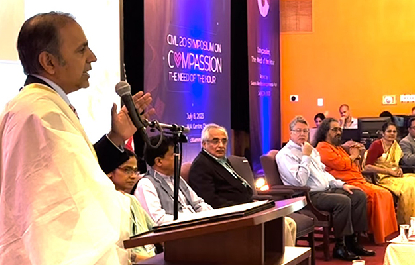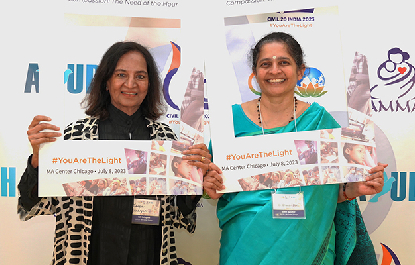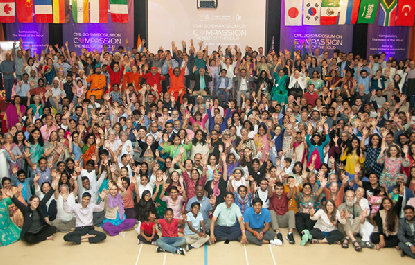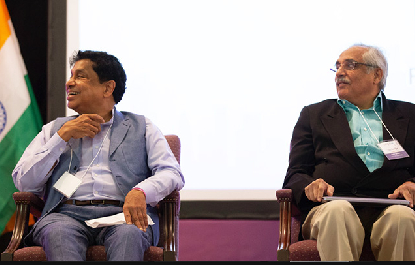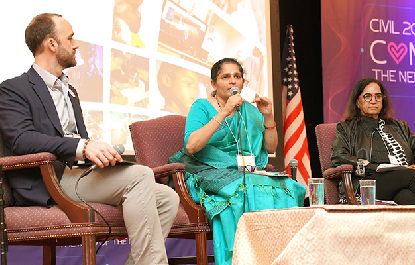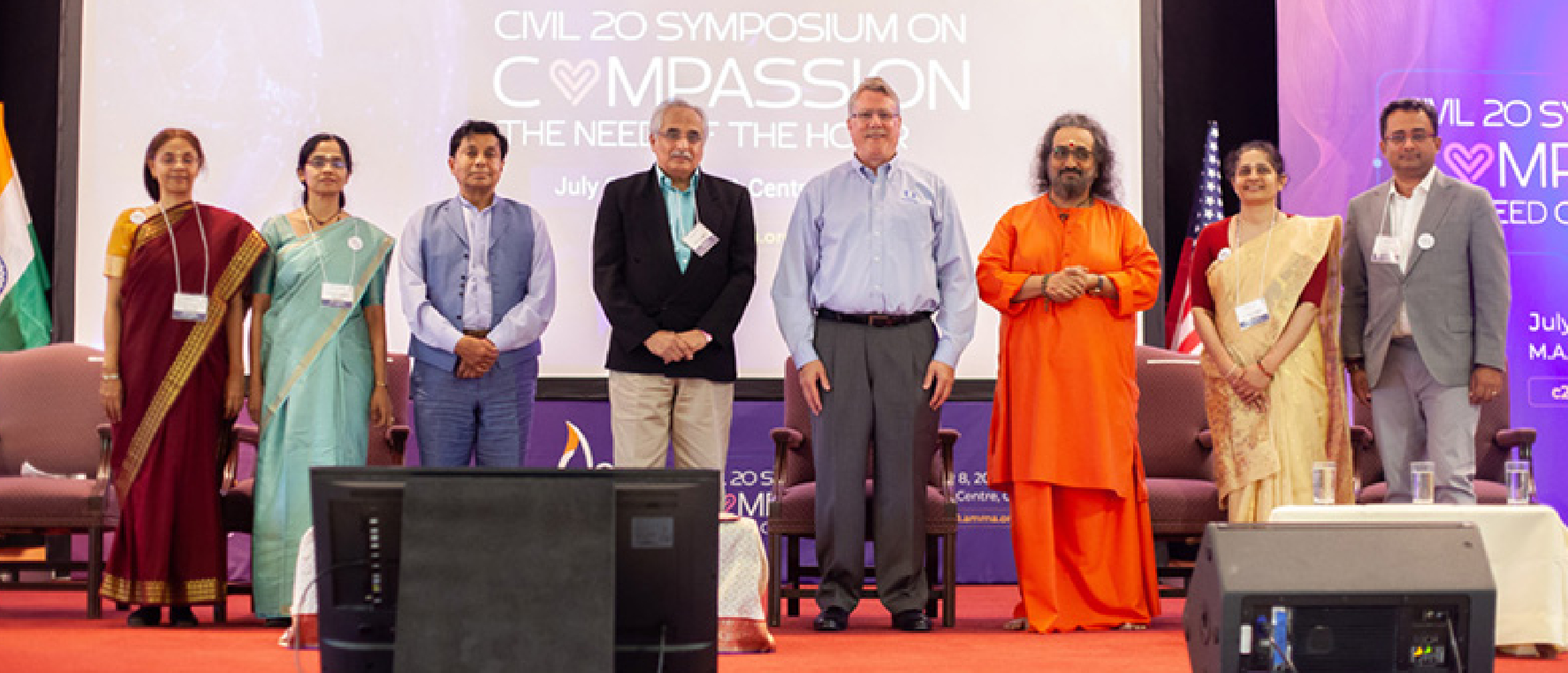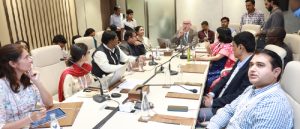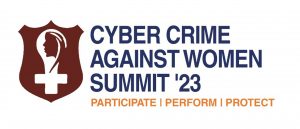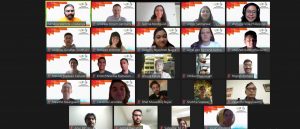July 8, 2023 – The C20 Symposium on Compassion, was held at MA Center Chicago in Illinois. It convened esteemed experts, scholars, and policy makers from across the globe. Working Groups leads from Amrita presented their learnings from the past year as have been compiling and framing policy recommendations for the G20 in their respective themes. Compassion was the central theme across the working groups.
Dr. Bhavani Rao led the Gender Equality panel along with Dr. Deepa Narayan, noted author, former World Bank Senior Advisor, and member of the C20 Gender Equality international advisory board. Dr. Christopher Coley moderated the session, facilitating a dialogue between the two panel speakers. The goal of this session was to both elaborate on the C20 Gender Equality vision and accomplishment so far, as well as to raise awareness and inspire the public to take action to promote social equality. The dialogue was conversational and punctuated profound points of self-reflection as well as humor and inspiration. During the course of the hour, three main points were discussed.
The first was on the fundamental values that are at the heart of the concept of Gender Equality. Specifically, understanding the role of compassion in gender equality in theory, and especially in action. Dr. Bhavani, related Amma’s teachings and the example she lives by as the source of inspiration for the activities and values that guided the C20 efforts so far. The strength, intelligence, and reflective capacity that comes along with real compassion has been the guiding star for all of the C20 policy dialogues, awareness campaigns, and policy recommendations generated. Dr. Deepa made the strong claim that this same principle of compassion also should be at the forefront of policy as well as community interventions. She described how an ideal politician or decision maker must have a sense of duty and responsibility to serve the needs of the most vulnerable of their constituents. She said, in fact we benefit as much, if not more by serving others. Our lives, our homes, our communities will benefit the more compassion we are. We should be fearless and confident in using the language of love and compassion in our policies, but also help facilitate this value in action and not allow it to stay only at the level of talk.
The second discussion question was on the fundamental frameworks that are needed to progress towards gender equality and sustainable development. Dr. Bhavani explained that the C20 Gender Equality Working Group utilized the AWESOME Framework to identify the 6 primary sub-themes. This framework was developed by the researchers in the Amrita Center for Women’s Empowerment and Gender Equality (CWEGE) as an outcome of years of experience working alongside rural communities in India. We learned first hand about the nature of the diverse, intersecting, and multidimensional issues facing women (and men) in the most vulnerable communities. The AWESOME framework attempts to capture as many of the broad dimensions of vulnerability faced by these communities, and in such a way as to ensure research and interventions can account for all of these issues. This provided an excellent organizing framework for the C20 process, allowing CSOs from multiple disciplines to contribute and thereby put forward the most practical and holistic set of policies to the G20. Dr. Deepa, in her upcoming framework publication that is being used by the World Bank to guide their next 10 years of efforts, put forward several principles that should structure our efforts towards Gender Equality. These points include strengthening our collective awareness to ensure a majority shares a single voice in demanding a more equitable and just society. This will in turn shift the power dynamics in society to support gender equality. Further, this mindset shift requires everyone to make the effort to change. Dr. Deepa said that women should strive to educate men in issues that women and minorities face, but without anger, violence, or shame. At the same time, men should endeavor to practice self-awareness and recognize the norms that they are perpetuating. The next principle extends this thought and requires that the gender norms that perpetuate inequality must be systematically dismantled through multiple channels, including infrastructure, workplace, community, and importantly in the home. Finally, when this takes place, a positive shift in economic opportunities, human endowments, and political leadership is needed to ensure the sustainability of these efforts.
The final point of dialogue centered around the accomplishments so far in the C20 process and the future goals of the large network of civil society that has formed around Amma’s leadership in India’s presidency. Dr. Bhavani played an inspiring video of the hundreds of policy dialogue events, town-hall meetings, and awareness campaigns. She highlighted the Jan Bhagidari and One Million Lights campaigns that have been able to reach over 600,000 students across India and over 550,000 nominations in the campaign. Dr. Deepa reiterated how incredible the accomplishments have been so far this year, and how much of an impact this will have given the excellent policies that have been put forward. She encouraged all of us to continue these efforts, to mobilize communities around the world to become more aware of the policies recommended and to lobby their local politicians to adopt them and put them into action. Both Bhavani and Deepa discussed the importance of engaging men and boys in the process, rather than placing the burden solely on women. Likewise, CSOs require the active participation of all stakeholders including the general public, government officials, and institutional leaders to ensure the goal of gender equality and sustainable development is reached.
